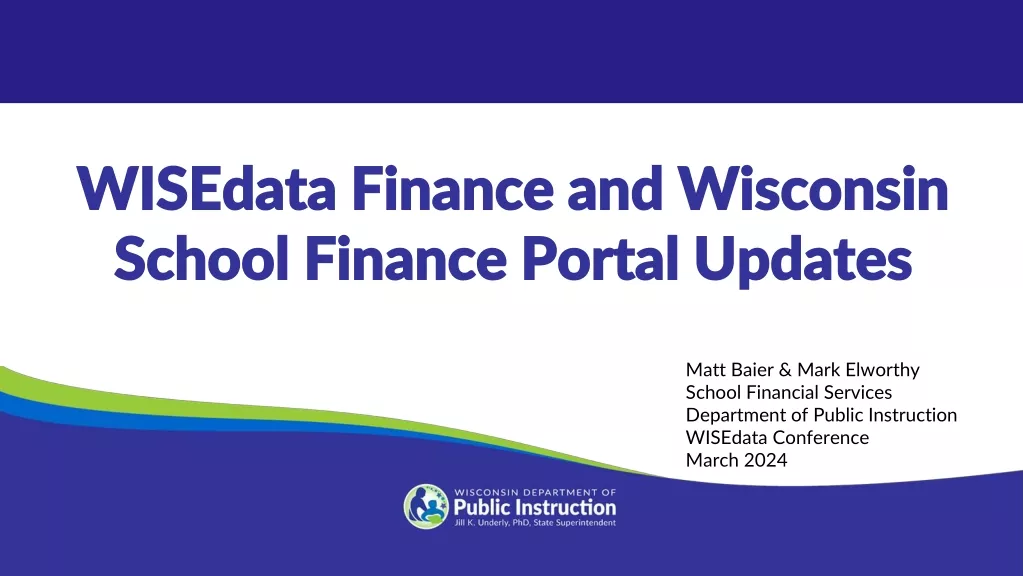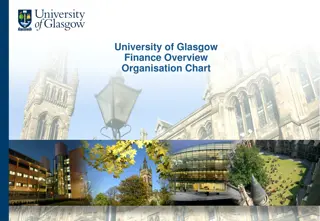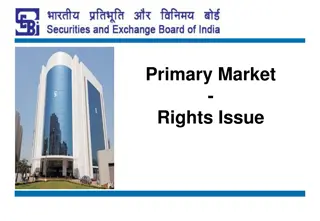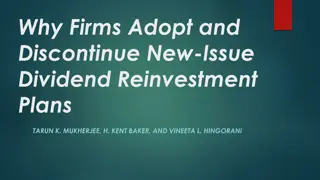New Issue Market in Finance
New issue market refers to the sale of securities by a company to the public for the first time. It involves various types/methods like public issues, preferential issues, and rights issues. Public issues include IPOs, FPOs, and FTIs. Preferential issues target select groups, while rights issues involve existing shareholders. Each method has its unique characteristics in the finance industry.
Download Presentation

Please find below an Image/Link to download the presentation.
The content on the website is provided AS IS for your information and personal use only. It may not be sold, licensed, or shared on other websites without obtaining consent from the author.If you encounter any issues during the download, it is possible that the publisher has removed the file from their server.
You are allowed to download the files provided on this website for personal or commercial use, subject to the condition that they are used lawfully. All files are the property of their respective owners.
The content on the website is provided AS IS for your information and personal use only. It may not be sold, licensed, or shared on other websites without obtaining consent from the author.
E N D
Presentation Transcript
New Issue Market(Primary Market)
Meaning of New Issue Market A new issue is a reference to a security that has been registered, issued, and is being sold on a market to the public for the first time. The issuer may be a new company or an existing company.
Types/Methods of New Issues Public Issues Preferential Issues Rights Issues Offer for sale Private Placement Bonus Issue
Public Issue When a company raises funds by selling (issuing) its shares (or debenture / bonds) to the public through issue of offer document (prospectus), it is called a public issue. Initial Public Offering(IPO) Follow on Public Offering(FPO) Fast-track Issue(FTI)
1. Initial Public Offering When a (unlisted) company makes a public issue for the first time and gets its shares listed on stock exchange, the public issue is called as initial public offer.
2. Follow-on public offer (FPO) When a listed company makes another public issue to raise capital, it is called follow-on offer (FPO).
3. Fast Track Issue(FTI) This facility is available to companies that are listed on the BSE or the NSE for at least three years.
Preferential Issue The listed companies issue securities to a select group of persons under sec 81 of the companies Act, 1956. Select group of persons: Financial Institutions Mutual Funds or High net worth individuals
Rights Issue When a company raises funds from its existing shareholders by selling (issuing) them new shares / debentures, it is called as rights issue. The offer document for a rights issue is called as the Letter of Offer and the issue is kept open for 30-60 days.
Offer for sale Institutional investors like venture funds, private equity funds etc., invest in unlisted company when it is very small or at an early stage. Subsequently, when the company becomes large, these investors sell their shares to the public, through issue of offer document and the company s shares are listed in stock exchange.
Private Placement The sale of securities to a relatively small number of select investors for raising capital. Investors involved in private placements are usually large banks, mutual funds, insurance companies and pension funds. Private placement is the opposite of a public issue, in which securities are made available for sale on the open market.
Bonus Issue The company issues new shares to its existing shareholders. As the new shares are issued out of the company s reserves (accumulated profits), shareholders need not pay any money to the company for receiving the new shares.
Parties Involved in the New Issue 1. Managers to the Issue Drafting the prospectus Preparing a budget suggest time to issue Assisting in Marketing Advising the company in appointment Directing the various agencies involved in public issue
2. Registrar to the Issue Appointed by lead managers. Logical support such as access to a computer, internet and a telephone. Redress the complaints.
3. Underwriters Underwriting is a contract in which an underwriter gives an assurance to the issuer that he will subscribe to the securities offered in the event of non-subscription by the persons to whom they are offered.

























